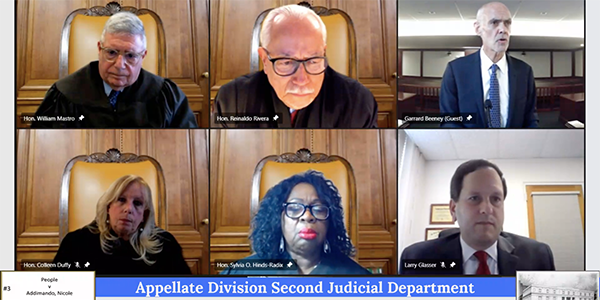A spotlight on Sanctuary Pro Bono Partner Sullivan & Cromwell for their team’s outstanding work in securing T-Nonimmigrant Status for a Guatemalan survivor of sex trafficking at the hands of a Customs and Border Patrol agent.
Sanctuary for Families’ Pro Bono Project has the honor of working with hundreds of extremely dedicated and expert pro bono attorneys annually. As part of our new Pro Bono Spotlight, we’ll highlight some of the great work done by Sanctuary pro bono attorneys!
*Please note that this blog contains descriptions of physical and sexual abuse that could be triggering*
Assisting a Survivor Fleeing Domestic Violence and Trafficking
Beginning in 2020, Sanctuary for Families partnered with Sullivan & Cromwell (“S&C”) on an appeal on behalf of a survivor of trafficking at the hands of a Customs and Border Patrol (CBP) agent who grossly abused his position of power over Ms. Aura Hernandez and her young nephew. In 2021, we learned that the appeal was successful and in 2022, Ms. Hernandez was granted T Nonimmigrant Status, which has put her on a pathway to citizenship. This was the culmination of over 15 years of struggle and courage on the part of Ms. Hernandez to ensure safety and security for herself and her family. Sanctuary is honored to have been able to support Ms. Hernandez on that journey, and forever grateful for the outstanding, creative lawyering of the S&C team who represented Ms. Hernandez on her challenging appeal.
Fleeing severe domestic violence in her home country of Guatemala in 2005, Ms. Hernandez and her nine-year-old nephew embarked upon a dangerous two-week journey to Texas that ended within the walls of a detention facility. Already traumatized and terrified, Ms. Hernandez was met with an abusive CBP agent who threatened deportation or family separation of her and her nephew if she did not comply with his forceful demands for sexual acts. In a small room at the detention facility, the CBP agent sexually assaulted Ms. Hernandez, and then failed to timely release her and her nephew. Despite this, Ms. Hernandez and her nephew were ultimately able to continue their journey to New York and she began to settle into a new life. Then, under the Trump administration, a new threat emerged: Ms. Hernandez was informed that she was to be deported back to Guatemala, regardless of the risk this posed to her life.
With this backdrop of fear, in 2018, Ms. Hernandez and her infant daughter moved into a Manhattan church for sanctuary. As she fought to remain in the United States, Ms. Hernandez’s case drew national attention, including coverage by The New York Times and other publications. She redirected that spotlight, becoming an incredible advocate for women and immigrants, speaking out about the inhumane conditions of ICE detention centers and the sexual violence that was rampant within their walls, as well as against the barriers that prevented her and her family from experiencing true safety. “I don’t intend to stand here with my arms crossed and do nothing,” she told The New York Times. “I have to stand up and raise my voice because an injustice is being committed to me and to us. I think I’m here for a reason.”
It was around this time that Sanctuary began working with Ms. Hernandez, helping her file for T Nonimmigrant Status. Sanctuary argued that she was a victim of trafficking at the hands of the CBP agent and that she had, as required to obtain a T-Visa, cooperated with the investigation into the sexual assault (though it had not resulted in any disciplinary action against the agent). However, the visa was denied, throwing Sanctuary into high gear, as notices of appeal and briefs in support must be filed within 90 days of the denial. Sullivan and Cromwell attorneys Olivia G. Chalos, Regina M. Roediger and Sharon Cohen Levin, a longtime Sanctuary pro bono partner and anti-trafficking advocate, jumped in to co-counsel with Sanctuary on the appeal and immediately set to work proving Ms. Hernandez’s eligibility.
Sanctuary Senior Staff Attorney Ines Chennoufi, who worked with the team, explained that the case was “particularly difficult because U.S. Citizenship and Immigration Services (USCIS) argued that Ms. Hernandez did not meet any of the eligibility requirements for a trafficking visa. Typically, at the appeal stage of a case, we only have to argue one discrete area of law or facts. Here, the Sullivan & Cromwell team had to argue that Ms. Hernandez satisfied all of the eligibility requirements for T Nonimmigrant Status.” One of the critical elements that the team had to prove was that Ms. Hernandez was a victim of a severe form of trafficking.
“In order to be eligible for a T-Visa, an applicant must establish that they were a victim of a severe form of trafficking, which includes a ‘commercial sex act.’ USCIS denied Ms. Hernandez’s application in part because it found that the sexual abuse perpetrated at the border was not ‘commercial.”
Ines Chennoufi
Senior Staff Attorney, Sanctuary for Families
The Sullivan & Cromwell team demonstrated incredibly creative and pragmatic lawyering to establish that the sexual act here was coerced in direct exchange for something of immense non-monetary value—freedom from the detention center for Ms. Hernandez and her nephew, and a safer life in the U.S. The team used the decisions in the Harvey Weinstein prosecutions to establish that the definition of a commercial sex act is broad and encompasses more than just monetary gain or something of economic value. They pointed out that in one of the Weinstein decisions, the court found that value can include “promises of career advancement” or the opportunity to meet a world-renowned film producer. These arguments were clearly persuasive–the decision issued by the Administrative Appeals Office (AAO) found that Ms. Hernandez’s safety and liberty, her fear of deportation and her nephew, all constitute things of “value” to her and the CBP agent used them against her to force and coerce her into providing a nonconsensual sexual act.
In the winter of 2021, Ms. Hernandez was informed by the AAO that she had successfully demonstrated she was the victim of a severe form of trafficking and her application was remanded to USCIS. In July 2022, she received the approval notice, granting Ms. Hernandez T Nonimmigrant Status for a period of four years. In three years, she will be eligible to apply for Lawful Permanent Residence (a green card) and eventually for citizenship.
“We are thrilled with this outcome for Ms. Hernandez, and proud to have partnered with Sanctuary’s incredibly talented lawyers on this challenging case.”
Sharon Cohen Levin
Pro Bono Partner, Sullivan & Cromwell
Sanctuary is profoundly grateful to the Sullivan & Cromwell team for being a critical partner in Ms. Hernandez’s fight for safety and security in the U.S. and for all their work on behalf of survivors of trafficking.
Join the team from Sullivan & Cromwell in standing with our clients. Your gift supports Sanctuary’s life-saving work with survivors of gender violence.



